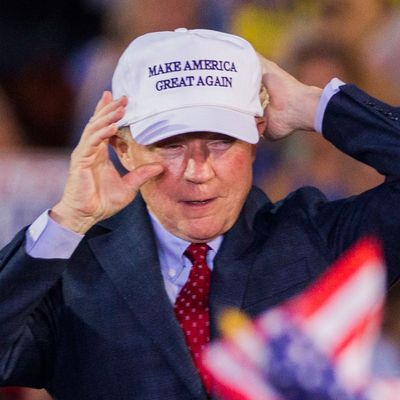
We have it on considerable authority that Donald Trump demands unconditional loyalty from subordinates. It is partially why he’s been so slow in filling positions in his administration: The Boss can’t have any of the many Republicans who said less than positive things about him before he rose to the presidential nomination. His penchant for loyalty has also got him into very hot water in the James Comey affair, if you credit Comey’s claim that Trump asked him for a highly inappropriate pledge of loyalty despite his knowledge that the ostensibly independent FBI director was investigating possible links between the Trump campaign and Russians trying to interfere in the 2016 elections.
Now there’s nothing inherently wrong with valuing loyalty (so long as the person asked to be loyal does not have, as Comey did, a sworn duty to be loyal to the law and the Constitution, not the president). But loyalty as the bond between a leader and the led only works if it is reciprocal. And there are growing signs that Trump has problems displaying loyalty to “his” people, if they are more convenient as scapegoats for his problems or failures.
This is hardly a novel insight. As the Washington Post’s Philip Rucker observed last month in examining the White House’s handling of the Comey firing, Trump’s struggle with accepting personal responsibility when things go wrong frequently overpowers any sense of loyalty he may feel:
Trump has been stewing all week, aggrieved by sharp media scrutiny of his decision to fire Comey and of his and his aides’ ever-shifting explanations, and has been quick to blame his staff, according to several people who have spoken with him …
White House aides have felt bewildered and alarmed by how Trump arrives at his decisions — often on impulse and emotion and sometimes by rejecting the counsel of those around him — and how he then communicates those decisions to his personnel and the public. Trump is in some ways like a pilot opting to fly a plane through heavy turbulence then blaming the flight attendants when the passengers get jittery.
It’s beginning to sink in among Trump’s loyal staff that, as the Post’s James Hohmann put it, “loyalty is a one-way street for Donald Trump.”
If there were any doubts about that proposition, they may largely be removed by more recent reports — made more credible by very public presidential tweets — that Trump is seething with resentment at Attorney General Jeff Sessions. Here’s how the New York Times explained the backstory to Trump’s anger at the Justice Department’s handling of the travel-ban litigation:
In private, the president’s exasperation has been even sharper. He has intermittently fumed for months over Mr. Sessions’s decision to recuse himself from the investigation into Russian meddling in last year’s election, according to people close to Mr. Trump who insisted on anonymity to describe internal conversations. In Mr. Trump’s view, they said, it was that recusal that eventually led to the appointment of a special counsel who took over the investigation.
And now that anger is spilling over into fury at Sessions’s handling of a revised travel ban the president himself signed, to replace a clumsily drafted version that his own staff wrote that immediately got into legal hot water that has yet to subside. It is so thinly veiled that Sean Spicer refused to tell the media on Tuesday that Trump still had confidence in Sessions:
As former solicitor general Walter Dellinger told the Times: “I believe it is unprecedented for a president to publicly chastise his own Justice Department.”
But this isn’t just any old Justice Department or any old attorney general: Trump owes an awful lot to Jeff Sessions, who was for a very long time his only Senate supporter, and who contributed as much as anyone to the bundle of views roughly known as Trumpism. If there is anyone to whom Donald Trump owes gratitude, and hence loyalty, it is Sessions.
Examining the president’s attacks on the Justice Department, Ezra Klein thinks the problem is less about Sessions than about Trump’s ambivalent understanding of how government works:
Trump ran for office posing as a savvy corporate executive who would manage the government like a business. But since winning the presidency, he has proven alienated and confused by the government he runs. He criticizes it in public in ways that make clear he doesn’t understand how to manage it in private. Harry Truman famously had a sign on his desk saying, “The buck stops here.” Trump isn’t sure where the buck stops, or how to find it, or even whom to ask about it. He doesn’t run the government so much as fight with it.
But Klein also reports a somewhat darker assessment from high-level Clinton- and Obama-administration staffer Ron Klain:
“Trump sees ‘the Trump administration’ as himself, his Twitter account, Jared and Ivanka, and a few close staffers at the White House,” says Ron Klain, who served as chief of staff to Vice Presidents Joe Biden and Al Gore.
From that perspective, Trump may view his good friend Jeff Sessions as having failed to tame his corner of “the government,” and thus no longer his good friend.
If so, it is a very bad sign for everyone else in Trumpland. Their loyalty to the president will apparently include taking the rap for his mistakes or the things he cannot control. And the scope of scapegoating required is likely to be pretty broad, considering that Trump once made the astonishing confession that he had never done anything in his life that required forgiveness from the Almighty.
Should the pattern continue, it will put all that loyalty to Trump to the ultimate test. And if begins to unravel, the leaks and signs of disarray we see now will only metastasize.






























